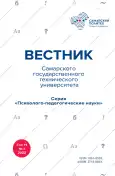Usage of the foreign websites on foreign language practical classes for development of students’ communicative competence
- 作者: Pushkareva I.A.1
-
隶属关系:
- Kuzbass Institute of the Federal Penal Service of Russia
- 期: 卷 19, 编号 3 (2022)
- 页面: 35-48
- 栏目: Theory and methodology of education
- URL: https://bakhtiniada.ru/1991-8569/article/view/109626
- DOI: https://doi.org/10.17673/vsgtu-pps.2022.3.3
- ID: 109626
如何引用文章
全文:
详细
The paper is devoted to considering the usefullness of authentic materials when teaching a foreign language in order to form the communicative competence of students. The author analyzes the concept of «authenticity,» highlighting its types, states and characteristics, as well as features of the use of authentic materials in the educational process. Classifying foreign official websites of law-enforcement bodies as authentic materials, the author considers them as one of their effective means of forming communicative competence in the absence of a natural linguistic environment. The author developed and methodically substantiated a system of working with authentic materials in the form of foreign official websites of law-enforcement bodies, which was tested in a practical lesson in a foreign language at the Kuzbass Institute of the Federal Penitentiary Service of Russia. The analysis of the experimental lesson allowed the author to come to conclusions about the feasibility and effectiveness of organizing work with authentic materials on the basis of a methodically developed task to form the communicative competence of students, expand their socio-cultural and professional knowledge and motivate them to study a foreign language.
作者简介
Irina Pushkareva
Kuzbass Institute of the Federal Penal Service of Russia
编辑信件的主要联系方式.
Email: pushkareva-irina@mail.ru
ORCID iD: 0000-0002-4786-1284
Cand. Phil. Sci., Associate Professor of Humanities, Social-Economic and Natural Sciences Department
俄罗斯联邦, Novokuznetsk参考
- Shcheglova N.V. Formation of communicative competence in the process of teaching foreign languages. Historical and Social-Educational Idea. 2011. No. 4 (9). Pp. 105–107.
- Widdowson H.G. Aspects of Language Teaching. Oxford: Oxford University Press, 1999.
- Lier L.V. The Classroom and the Language Learner. N.Y.: Longman, 1988.
- Breen M.P. Authenticity in the Classroom. Applied Linguistics. 1985. No. 6/1. Pp. 60–70. doi: 10.1093/applin/6.1.60
- March T. Are We There Yet? A Parable on the Educational Effectiveness of Technology. Multimedia Schools Magazine. 2000 Vol. 7. No. 3. Рp. 10–15.
- Maslow A. The Farther Reaches of Human Nature. N.Y.: Viking. 1971. 407 р.
- Smirnova L.E. Metodicheskaja autentichnost' v obuchenii inostrannomu jazyku [Methodological authenticity in teaching a foreign language]. INNOVATION SCIENCE. 2016. No.11–2. Pp. 129–131.
- Nosonovich E.V., Mil'rud R.P. Parametry autentichnogo uchebnogo teksta [Options of authentic training text]. Inostrannyje jazyki v shkole. 1999. No. 1. Pp. 11–18.
- Shulgina E.M. Authenticity as one of methodical conditions at formation of foreign language communicative competence of students by means of webquest technology. Language and Culture. 2013. No. 2. Pp. 84–87.
- Voronina G.I. Organizacija raboty s autentichnymi tekstami molodezhnoj pressy [Organization of work with authentic texts of the press for youth]. Inostrannyje jazyki v shkole. 1995. No. 6. 119 p.
- Khromov S.S., Kamenev N.A. The technique of using authentic internet resources in english language teaching. Russian Journal of Education and Psychology. 2015. No. 7 (51). P. 275–282.
- Federal'nyj zakon ot 9 fevralja 2009 g. N 8-FZ «Ob obespechenii dostupa k informacii o dejatel'nosti gosudarstvennyh organov i organov mestnogo samoupravlenija» [On ensuring access to information on the activities of state and local authorities]. URL: http://www.consultant.ru/ (accessed: June 06, 2022).
- Lejchik V.M. Jelementy terminovedcheskoj teorii teksta: sbornik nauch. trudov [Elements of the term theory of text]. Perm'. 2002. P. 63–77. (In Russian)
- Shvedak A.I. Sushhnost' ponjatija «autentichnye materialy» v kontekste obuchenija inostrannomu jazyku [The essence of the concept of «authentic materials» in the context of teaching a foreign language]. Molodoj uchenyj. 2018. No. 22 (208). P. 360–363. URL: https://moluch.ru/archive/208/50892/ (accessed: June 11, 2022).
- Kapustina L.V. Analysis of current trends in the digital technologies use when teaching foreign languages (case study of learning websites). Scientific and methodological electronic journal "Koncept". 2020. No. 03. P. 48–56. URL: http://e-koncept.ru/2020/201020.htm. (accessed: May 23, 2022).
- Kazakova M.A. Evtyugina A.A. Authentic written materials in teaching a second language. Vestnik burjatskogo gosudarstvennogo universiteta. Obrazovanie. Lichnost'. Obshhestvo. 2016. No. 4. P. 50–59.
- Dik V.V. Urintsov A.I. Individual educational pathway as the main instrument of education in information society. Open Education. 2014. No. 1 (102). P. 32–35.
- Sidarenko T.V. Authentic videos in foreign language teaching: principles of choice and methodic adaptation. Proceedings of Voronezh State University. Series: Linguistics and intercultural communication. 2012. No. 1. P. 207–210.
补充文件







